
Queens’ first Nobel Laureate
Sir Demis Hassabis (1994, Honorary Fellow & Fellow Benefactor)


Queens’ first Nobel Laureate
Sir Demis Hassabis (1994, Honorary Fellow & Fellow Benefactor)

It is with excitement and sadness that I have embarked on the final year of my term as President of this wonderful College. I look forward to our community’s continued progress while also dreading the day I will step down from serving it as President. This has been the most fulfilling and enjoyable job I have had.
There was no better way to kick off this new academic year than with the wonderful news that Sir Demis Hassabis had been awarded the Nobel Prize in Chemistry for his work in developing “an AI model to solve a 50-year-old problem: predicting proteins’ complex structures.” Our community was absolutely thrilled!
For years, Demis has inspired many at Queens’, not only through his groundbreaking work in Artificial Intelligence and Machine Learning but also through his innovative approaches, energy, commitment, and leadership. His pioneering efforts are benefiting, and will continue to benefit, countless individuals in society. Despite the many demands on his time, Demis has taken the time to visit Cambridge, engage with students and Fellows, and support several new and existing initiatives at Queens’.
These initiatives are, as you will read in this edition of The Bridge, part of the continued progress we are making in the five strategic areas approved by the Governing Body.
In terms of academic excellence, we have further expanded and deepened our Fellowship. Under infrastructure, work has continued to decarbonise and modernise the Erasmus building, while preparations are underway for a major revamp of the Owlstone Croft site. We’ve continued to widen participation by strengthening our outreach efforts and increasing scholarships and financial support for students. Our focus on governance has seen a streamlining of Committee work and enhancing efficiency and accountability. Lastly, financial resilience remains a key objective, supported by continued sound debt and cash management, as well as a larger (though still limited) endowment.
This superb team effort has taken place against the backdrop in recent years of a pandemic, an energy shock, a general inflation surge, and spillovers from tragic conflicts that have seen so many lose their lives, their families, and their livelihoods.
The advances have involved important structural improvements that further strengthen the foundation for future progress. None would have been possible without the incredible support and guidance we receive from our alumni, donors, and friends. We are extremely grateful for your kindness, generosity, and thoughtfulness.
On July 20th I expressed to the Governing Body my intention to step down when my current term ends in September 2025. Under the leadership of our Vice President and Senior Fellow, the Governing Body has initiated the process leading to the election of the next President.
This was a very difficult decision for me. One that I did not take lightly, and for good reasons. As my daughters will tell you, “Queens’ is dad’s happy place.” I felt at home in this community when I first arrived as a student in 1977, loved my time as a student, and cherished every moment serving as President. I have been honoured to be part of the team effort helping Queens’ build on the significant progress made under Lord Eatwell’s presidency.
It is my hope that Queens’ accomplishments this year will again illustrate that our College is in a strong position to deliver even greater opportunities and an ever-better experience for our community. In addition to my “normal” duties, I will spend my time conveying the depth of my gratitude, looking back and reminiscing not just on the many fun times but also the challenges, and looking forward to all that this extraordinary community, to which I owe so much, will still achieve.
Thank you again for all your support, feedback, and good wishes.
All the best,

Mohamed A. El-Erian
Please send your news & photos to
Honorary Fellow Sir Demis Hassabis (1994) was jointly awarded the Nobel Prize in Chemistry alongside Dr John Jumper (St Edmund’s, 2007) and Professor David Baker.
The prize was awarded in October to Sir Demis and Dr Jumper for protein structure prediction using artificial intelligence. David Baker receives his half share of the prize for computational protein design.

The AI model AlphaFold2, developed by Sir Demis and Dr Jumper at Google DeepMind, uses amino acid sequences to predict protein structures. Using this, they have been able to predict the structure of virtually all the 200 million proteins that researchers have identified.
Sir Demis developed his interest in machine learning as a student here at Queens’. He went on to co-found DeepMind, which has gone from strength to strength. He is widely regarded and greatly respected as a top pioneer in the field of general AI and machine learning. Professor Alastair Beresford, Director of Studies in Computer Science, who knows Sir Demis well, noted that “It is wonderful to see Demis’s work recognised at the highest level – his contributions have been really transformative across many domains. I’m looking forward to seeing what he does next!”
Sir Demis was also awarded a Knighthood for services to artificial intelligence in the spring.
This is the first Nobel Prize to have been won by a member of Queens’. We are delighted to congratulate Sir Demis on this achievement and hope to feature more about this award in the next edition.

Dr Ed Barsley (Architecture, 2010) codesigned a Flood Resilient Garden (on behalf of “Flood Re” – a re-insurance scheme) at this year’s Chelsea Flower Show. Ed is an expert in environmental design, with a focus on developing strategies to improve the resilience of communities and the natural environment. This design helps gardens to reduce flood risk and recover quickly after periods of heavy rainfall.
Speaking about the project, Ed stated, “We wanted to design a garden that would show that resilient design doesn’t have to be a compromise. You can still have a beautiful garden/home and it can be enhanced by making these changes.”
To keep up to date with alumni news and events, and what the Alumni and Development Office is currently up to, follow our account on X @QueensAlumni
In June, Dr Lewis Owens (1996), who funds the Dr Lewis Owens Postgraduate Bursary at Queens’, completed a sponsored walk in Cambridge stopping at all 31 Colleges. The walk aimed to raise funds for the MCR Cognition and Brain Sciences Unit at Cambridge. He exceeded his original fundraising goal, reaching over £16,500 in donations.

Jim Cockin (1991) was searching for an illustrator for his novel Ghost Tide, a Gothic adventure for children that has now been published by Eye Books. Through a friend, he was introduced to someone ‘whose daughter is at Cambridge and has a passion for drawing’. When they arranged a video call, Jim was astonished to recognise Martha Vine’s (2022) room in the Fisher Building, just a staircase away from his old room, where he also studied English – albeit 30 years earlier! Moreover, Martha is also reading English. Jim stated, “The book seems to have become – rather accidentally –a ‘made in Queens’ affair’ spanning the generations.”
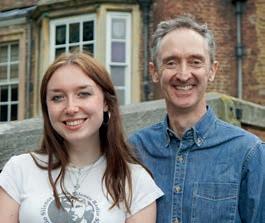
Brett Cotten (2019), who co-founded Arda Biomaterials in 2022, was recognised in 2024 on the Forbes “30 Under 30” list in the Manufacturing Industry category for Europe. Additionally, his company received the prestigious London Cleantech Startup of the Year award.
Dr Cyrus Golding (2014) received the Ordnance Survey Award for excellence in secondary geography education from the Royal Geographical Society (with IBG).
Professor Harriet Bulkeley OBE (1992) was awarded an OBE for Services to Geography and Environmental Governance. Harriet is a University Lecturer at Durham.
Michael Sternberg OBE KC (1970) was awarded an OBE for Services to Faith & Integration for his work as President and Chair of the Faith & Belief Forum.
Colonel Aran Jess, OBE (1995) was awarded an OBE for distinguished service in the Royal Marines.
The President of Bangladesh dropping in unannounced to see the College; seeing the start of work on Erasmus Building; connecting with alumni in, among other places, Saratoga, Shanghai, Lewes, Milan, the Peak District, Kuala Lumpur and Hong Kong; and current students, staff and Fellows donating to Giving Day

Baroness Worthington (1990) in
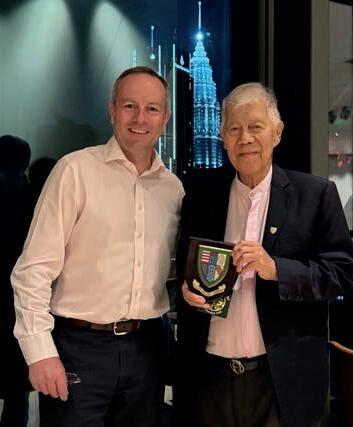


Joe Hertzberger (1964), The President (1977) & Jacob Navon (1977) in New York


Cripps Court accommodation is 50 years old this year and we will celebrate with the Cripps family and others next summer. The Cripps benefaction is arguably the greatest game-changer for the College since the 15th century.
The Chapel will soon be able to livestream some services and events, thanks to new equipment (and lighting). We hope alumni around the world will enjoy this.
Subject funds in History and Engineering (The Osborne Reynolds Fund) have been completed – warm thanks to those whose donations will support these subjects in perpetuity.
To rejuvenate our student accommodation across the entire estate over the next 20 years and to increase room capacity.
Erasmus Building renovation will finish by June 2025.
Funding for student accommodation at Owlstone Croft and the new house on Grange Road, plus the Archives Centre in the old chapel there.
Basketball Club Fund; Squash Club Fund; Alexander Crummell postgraduate scholarships.


1) “What’s the size of the College’s endowment now?”
Answer: Around £110m up from about £46m in 2006
2) “When is my next reunion?”
Answer: We hold 10th and 40th reunions, and 25th and 50th reunions, during the spring of alternating years. There is also a lunch for those who matriculated 60 or more years ago in October each year. Find out more about our alumni events schedule at www.queens.cam.ac.uk/alumni-events


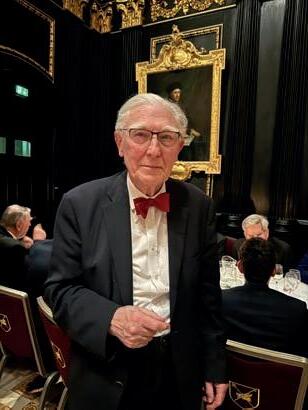
We now have about 550 postgraduates and 500 undergraduates.
15% of alumni donate to the College – a UK registered charity – up from 7% ten years ago; that’s about 4% above the college average in Cambridge. Thank you!
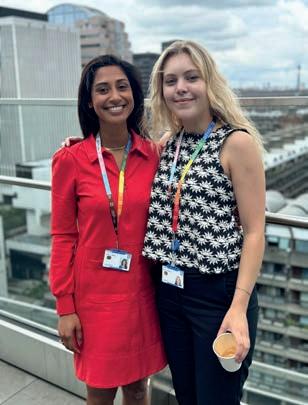
Producer Michael Waldman was invited back to the College to celebrate the anniversary of the famous TV programme that explored life at Queens’…
What were the steps that led to the documentary specifically happening at Queens’?
There was some conversation between my boss, Will Wyatt, the then Head of Documentaries at BBC Television, and the then Senior Tutor, Dr John Green. It was indicated that a documentary would be viewed positively if an approach was made. My boss no doubt acknowledged the risks but indicated potential benefits: showcasing the College could counter misconceptions, like clichés of elitism, and even attract more applicants from a wider base, though that wasn’t the main motivation.
Then I came up for an extraordinary two-day long interview with the JCR, the MCR, and the SCR. The undergraduates asked the toughest questions, and I think they felt there was an element of sport in it. They were in a position of power, I was someone who was in a sense in supplicant mode, and they had been given the right, of course, to question and to make a judgment. I said to them: “Yes, you’re right, I could completely stitch you up, and you’ve got to trust me.”
What was the filming process for this project?
It’s very different now technologically, but in those days, it was all shot on celluloid. We had a cameraman and an assistant who loaded the magazines, each holding only ten minutes of film, the film had to be repackaged in a black bag to protect it from light. I mean, the technology is so dinosaur. Our crew consisted of myself, the assistant producer, the cameraman, his assistant, and a sound recordist. The crew stayed in a hotel, and the assistant producer and I lived in College. I chose to live in the little set just by the bridge, with the view of the Porters’ Lodge. Though it was not very light,
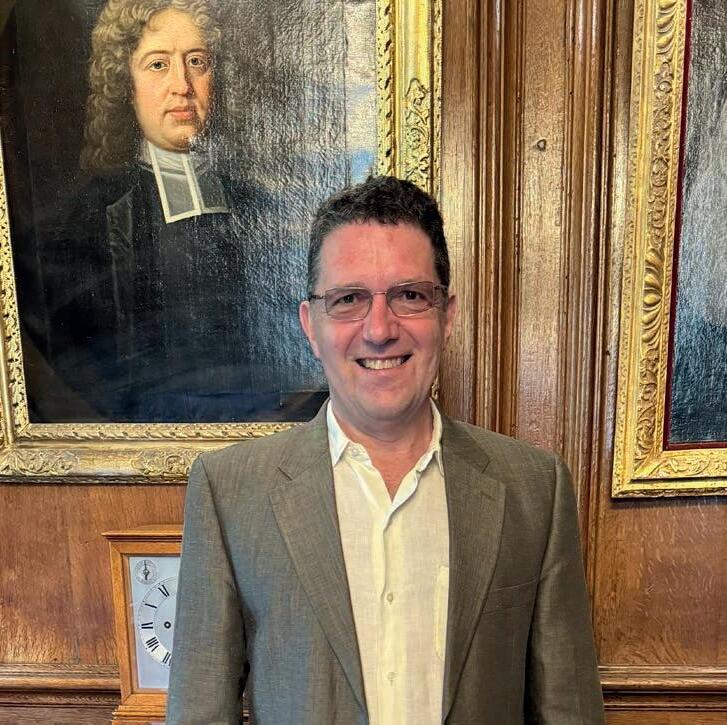
it allowed me to sit at the windowsill and watch the world go by. If I wanted to ‘accidentally’ bump into somebody, I could pop out of my room and say, “Hi, how are you? What’s up?”
How did you plan what the themes were going to be for each episode? Were they planned, or did you film and then edit it into the themes afterwards? A bit of both. As in most documentaries of this
sort, you have an idea of what you might do, what events might occur, and how to cover them. Filming the admission interviews was particularly challenging and required extensive negotiation with individuals on both sides of the door. Then we needed to find stories that covered the Fellowship and the students, both academic and otherwise, such as sports and artistic pursuits – as well as the staff. We had to cover certain themes, including the myths
“I found Queens’ to be a completely fascinating place… There is an aesthetic and heritage quality to the place that stands out, at the same time as a friendly face and cutting-edge work.”
about elitism and so on, which, of course, were only partly mythical.
What other challenges did you face during the production?
Many! One challenge was figuring out how to navigate such a complex society. How does anybody ‘plug in’? We had to know everything about everybody, which of course we couldn’t, but by the end, we did know an awful lot about most areas. Observational filming requires a degree of intimacy, so we had to build trust with the people we were filming. I remember going drinking with the rugby guys without a camera to gain their trust. If I had just sipped a sherry while they drank six pints, I wouldn’t have endeared myself to them. Because of that effort, they allowed me to film them drinking without worry. I had to do similar things in all environments, including getting to know the President, the wonderful Professor Ron Oxburgh. He had his doubts, but he was basically in favour of this happening. Without his support, we probably would never have done it.
Do you think that this style of documentary-making is something that could happen nowadays?
I think it would be more difficult due to greater media awareness and potential concerns from the Fellowship about their duty of care to individuals. One of the differences is that there wouldn’t be an appetite from the broadcaster to air 40-50 minute episodes on prime time BBC Two for ten weeks. The style of television has changed; a long, slow title sequence would probably prompt someone to say, “Can we speed this up?” With a competitive environment of 75 channels to choose from, you need to grab viewers quickly. So, I think the style of production would have changed. Streaming has changed things as well. Would Netflix take this? I have no idea. The proposition would have to be very particular. But it might be that a slightly more languorous style or a niche viewership, as seen with streaming services, would make it more feasible.
What is the enduring appeal of documentaries like this?
I’ve done a lot of different sorts of programmes since I made that series 40 years ago. But in a somewhat similar vein ten years later, I created The House, a six-episode series on

BBC Two about a year in the life of the Royal Opera House, which won me a BAFTA and an International Emmy. Six years ago, I made a three-part series for BBC Two called Inside the Foreign Office. So, there is still an appetite for observational documentaries that offer insights into life in various places. Often, it’s flashing blue light type environments, such as police stations and hospitals – endlessly, of course, with all of the inevitable drama there – but there is also interest in more ‘normal’ settings with a different pace, such as the ones I’ve done in a government department, theatre, or a university. There’s something attractive about a precinct, a place. Within that place, you get a sense of life happening in all its forms.
Do any individuals stand out from your time at Queens’?
I found it completely delightful and wonderful, though mad in one sense, that Professor James Diggle could create fabulous speeches in Latin while entertaining his young children (who I called the Digglets) who must now be in their 40s. We also accompanied the thenpresident, Professor Oxburgh, a geologist, on a trip to some islands off Scotland, where he demonstrated to undergraduates how certain

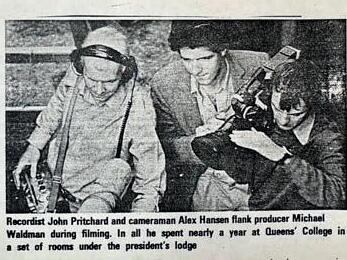
rocks are formed. Ever since, whenever I travel and see interesting rock formations, I think, “I want to ask Ron Oxburgh!”
How did you find the environment at Queens’?
I found Queens’ to be a completely fascinating place. It had a unique history and personality, and indeed it didn’t have the same funding as some colleges – we didn’t go into the economics of the place much, but I was aware that it wasn’t like Trinity or King’s with huge endowments – which created a distinctive and slightly more challenging atmosphere. There is an aesthetic and heritage quality to the place that stands out, at the same time as a friendly face and cutting-edge work.
I remember persuading the Cambridge Fire Brigade to lend us a fire engine for an afternoon, probably with the incentive of some coffee money, so my cameraman and I could go up the extended ladder to take amazing aerial shots. This was before the days of drones and probably before certain regulations would have prohibited it. Watching the beauty of the space from above, I thought, “God, this place is really beautiful.”

Began career in academia with a PhD at Cambridge
Gained a PGCE in Primary Education after working as a Teaching Assistant and Language Tutor
Joined Queens’ as Schools’ Liaison Officer (Bradford) in 2023
Passionate about empowering and encouraging young people in the area to pursue higher education programmes.
Going into communities
Some schools are very excited to have contact with us, they see it as something really special, but we would like to reach a point where it is a normal part of the educational landscape for these young people. Currently students in Bradford might think about university, but assume they’d probably go to Bradford or maybe Leeds. Many young people are contemplating staying at home, with concerns about the cost of living. We can say, “We can open up opportunities for you. We’ve got financial support for you. You can access the Cambridge Bursary. You might be able to access the Foundation Year as another route into these opportunities.” I think it’s an important part of the bigger picture.
Common questions from prospective students
We hear things like, “Will I fit in? Will I be able to live in an Islamic lifestyle? Will I be able to make friends? Will everybody be posh? Will everybody make fun of my accent? Am I academically good enough?” Many of these young people have limited experience outside of their immediate community, so, for them, it’s quite a brave decision to put yourself out there, particularly for a very competitive admissions process.
I’ve got some fantastic student ambassadors from Queens’, representing students who’ve come to Queens’ from Bradford, to show those young people that you can come to Cambridge and you can still wear your Bradford City top, you can still wear your hijab!
We are setting up Parent Power in Bradford in collaboration with the Brilliant Club and Dixons Academies Trust. It’s a combination of community organising alongside higher education information, advice, and guidance. The idea is that we get a group of parents on board from the three schools involved, and they identify the area that they want to campaign on to create change in the community. My role is to provide them with the information and the advice that they feel that they need to support their young people, and also become champions within their community.
The Centre is located in Holme Wood, a particularly under-resourced community in Bradford East. They work with a particular group of schools in the locality to run sessions from primary school upwards, centred around
“ I would say that there is a real appetite from schools to show young people the opportunities that we can offer – to show them that this is an environment in which they could feel at home – and the support from alumni in terms of funding is crucial to enable us to continue doing that.”
a particular university subject. They find out more about what university is and why people go there and do transition activities to support the pupils as they’re moving up into the high schools. They’re also working in collaboration with the large sixth form colleges in Bradford, to present university as a realistic expectation for young people. Some of our undergraduate students have been virtually mentoring students, working on particular projects, developing their confidence, developing their communication skills, supporting them with homework, and the Centre has been really pleased with the quality of the support that our students have been able to offer.
The University’s new Access and Participation Plan involves targeting particular areas of socio-economic deprivation and particular demographic groups. Students, for example, who’ve been accessing free school meals, or students from underrepresented ethnic minority groups, and that includes British Pakistani and British Bangladeshi students. What we are doing in Queens’, by having somebody embedded in the region, is enabling a very personalised approach to those areas and a real understanding of the context in which schools are working to support those particular groups.
Mine is one of very many parts of the country where the independent school sector is a tiny minority of the young people in the city. Whereas some schools, in perhaps more privileged circumstances, might be able to have a member of staff who is a designated Oxbridge co-ordinator, I’m able almost to take on that role for schools where they might only have 1 or 2 students in a year group for whom Oxbridge admission is a realistic possibility. At the same time, I am modelling that you can be
a Bradfordian and you can be at Cambridge, and you can combine the two and be quite comfortable with that.
This year, I’ve been able to bring over 70 young people to Queens’ through the University’s HE+ scheme. We’ve also got Key Stage 4 access days, which have enabled students across seven schools to visit Queens’, and we’ve been fortunate to secure some funding from the Isaac Newton Trust Widening Participation Fund to enable more schools to take part next year. Schools are in a very difficult situation, financially and in terms of staffing – being able to say to them that the places are available and the coach is organised makes it a realistic possibility for them in a way that it just wouldn’t be otherwise. Plus it’s a long way to travel!
I would say that there is a real appetite from schools to show young people the opportunities that we can offer – to show them that this is an environment in which they could feel at home – and the support from alumni in terms of funding is crucial to enable us to continue doing that. If we want the College to continue to be a vibrant and welcoming place that draws in people with different perspectives and different ideas, the work that we are doing around access is crucial! I think it’s the right thing to do in terms of us attracting that diversity of students who are going to make this an intellectually exciting place, but it’s also the right thing to do in terms of social justice. There are fantastic, motivated students out there who have had barriers put in the way of their attainment, but who are striving to get as far as they can. Things like our outreach programme and the Foundation Year programme make a massive difference.
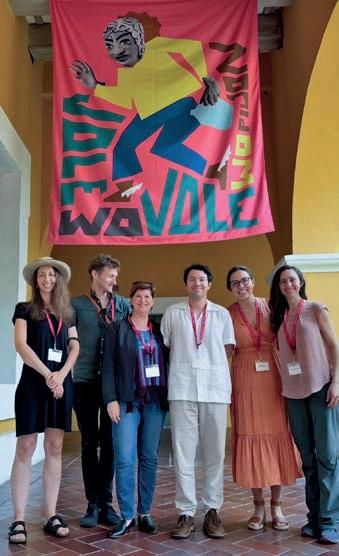
San Juan, Puerto Rico
Thanks to the Weil Travel Award, I was able to attend the Conference of Latin American Geography (CLAG) in Puerto Rico this year. The conference brought together leading experts, researchers and practitioners in the field, offering an invaluable opportunity for professional growth, networking, and knowledge exchange.
The conference provided an excellent platform for networking with peers, mentors, and leading experts. I had the opportunity to engage in meaningful discussions and establish connections with professionals from around the world. I was also able to meet with one of the main authors I have been engaging with in my research, which provided new avenues of thought and discussion.
I am profoundly grateful to the Weil Travel Award and Queens’ College for the generous grant that made my attendance at CLAG possible.

New Haven, USA
I was invited to an in-person audition for drama school at Yale and applied to the Queens’ travel fund to seek help with affording the trip. I was thrilled to find out that I had been awarded the Weil Travel Award to help with the costs.
Although I made it through to the second round of auditions, I was not granted a place on the course. Nonetheless, the trip gave me so much confidence in myself and I’m proud to have made it as far as I did. I have now accepted a full-scholarship for the threeyear acting course at the Royal Academy of Dramatic Arts (RADA) which begins in September.

Brighton, UK
In April I was able to attend the annual conference of the Undergraduate Linguistics Association of Britain (ULAB) in Brighton thanks to the Bradley and Etough travel awards, where I presented my research to other students of Linguistics. Doing so reassured me that following the path of academia is the right decision for me.
I enjoyed explaining my methods and findings to other young academics, just as I loved hearing them speak about theirs. I am delighted to be pursuing my academic ambitions and am now going to pursue a research Master’s programme at Leiden University in the Netherlands.
I wholeheartedly thank Mr Trevor Bradley (1989) for his financial support.
The Weil Travel Fund was set up during the 1970s in appreciation of the late Michael Field (1939), by his mother in law, Eugenie Weil.
Amirah Marzook (2022) – Dikran Knadjian Medical
Scholarship Recipient 2024
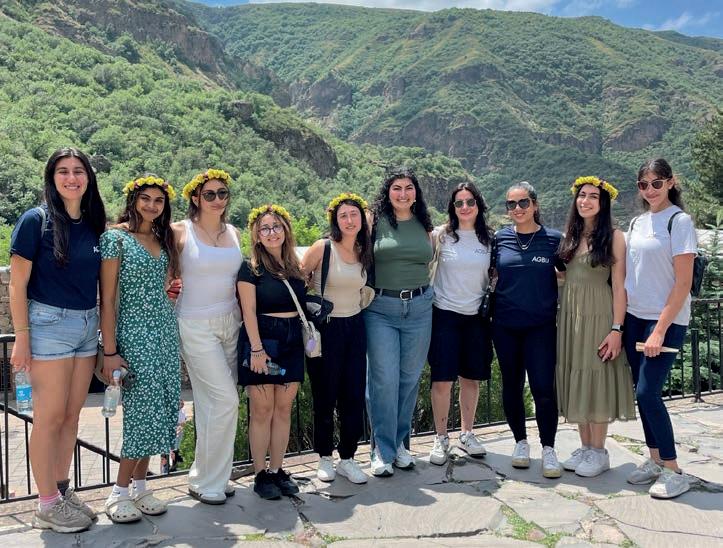
During the summer, I participated in a 5-week programme organised by the Armenian General Benevolent Union (AGBU) in Armenia. It was my first time visiting Armenia, so I was unsure of what to expect when I arrived. The aim was to spend several weeks shadowing doctors in the Heratsi Hospital Complex and, as a medic, I thought that this would be invaluable clinical experience that I could reflect on in the future. Little did I know that this was only a small part of the many great memories and experiences I would gain from the trip.
I was able to spend time in the surgical, emergency, and cardiology departments throughout my time – each one interesting but different from the others in terms of the category of patients that would be seen and the types of treatment and care offered. The surgical department had a much higher turnover of patients compared to cardiology, with patients leaving the hospital within a few days of their operation. In cardiology, patients could stay on the ward for up to a week!
Throughout my weeks at the hospital, I got to spend time getting to know individual patients and their families which was a very heartfelt experience that I will cherish forever. Since I was unable to speak Armenian, this was initially a barrier that I had to overcome to make the most out of my time with the patients. I was very lucky to be placed with such a friendly and kind healthcare team who were willing to translate their conversations with both the patients and other colleagues into English so that I could understand as well.
I was taught how to do echocardiograms and even take blood samples from patients, which allowed me to have a more active role in the placement. After spending some time during the day at the hospital, as a part of the programme I participated in different cultural activities, including Armenian language and dance lessons. Learning the Armenian alphabet allowed me to appreciate the complexity of the language, as well as the differences between Eastern and Western Armenian – to add a
The Dikran Knadjian Medical Scholarship was set up in honour of Dikran (1970) by his siblings almost 10 years ago.
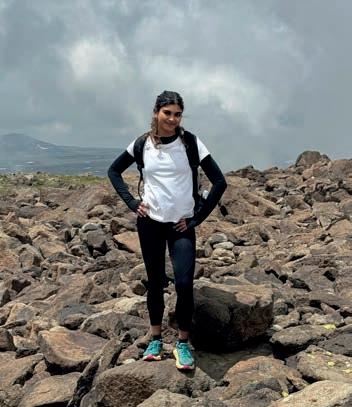
further degree of confusion! The dance lessons were also a fun activity and, at the end of the programme, we even performed our dance to children in a local community centre.
At weekends, the other AGBU programme participants and I were able to explore different historical sites in Armenia. We visited Khor Virap and the old town of Gyumri, where we tasted the traditional cuisine and learned about the rich cultural heritage. Throughout these trips, I was able to bond with the other programme participants – both through excitement and the traumatic experience of climbing Mount Ararat! These lifelong friendships and the hospitality of the locals I met were some of the best parts of the trip, and I have made memories that I will cherish forever.
After just expecting to gain medical experience from the trip, I have left with many friends, cultural knowledge, and experiences that I will never forget. It’s an opportunity that I will forever be thankful for.

The College has an ambitious plan to finally bring together all of our historic archives into one accessible, secure space.
Comprising an environmentally-controlled store and public reading room, the proposed Archive Centre will enable us to exploit our outstanding collections for teaching and research, in accordance with the highest curatorial standards.
Since 1968, our medieval and early modern archives have been on loan to Cambridge University Library, where they were deposited due to lack of space and adequate facilities at Queens’. We are grateful to Cambridge University Library for having kept the collection in a secure space that meets the required environmental conditions, but access is highly restricted, and conservation work is necessary. Extensive mould and insect damage (predating 1968) has meant that some volumes cannot currently be issued for consultation by readers.
These precious archival collections constitute a grossly underutilised college asset of international importance in terms of scholarship and outreach. We need access and control over them so that our archivist and librarians can properly catalogue them, conserve them, and make them available as a living, working resource for teaching, research and exhibitions.

The Queens’ Archives are widely recognised to be of enormous historical value, and not only as a source for the College’s history, since they contain documents dating back to the twelfth century.

They include magnificent foundation and governing records dating back to the College’s beginnings (some bearing a royal seal), together with associated academic and tutorial records, which if catalogued, would open up infinite possibilities in terms of research. Of particular note are account-rolls and manor court-rolls relating to various estates of Crowland Abbey dating from around 1258 onwards.
The extensive series of Queens’ bursars’ and cooks’ accounts and buttery books (fifteenth-nineteenth centuries) are recognised as being among the richest records of any Cambridge college as a household. These indicate what the College consumed, who supplied it, from where, and much other evidence of interest to research – not just into Queens’, but into social history more generally. The College Archives also represent a close counterpart to the College’s other historic collections, in particular, its Old Library, given that many of the latter’s printed books were given by, or written on, by individuals who feature strongly in the College Archives.
“ The Queens’ Archives are widely recognised to be of enormous historical value, and not only as a source for the College’s history, since they contain documents dating back to the twelfth century.”
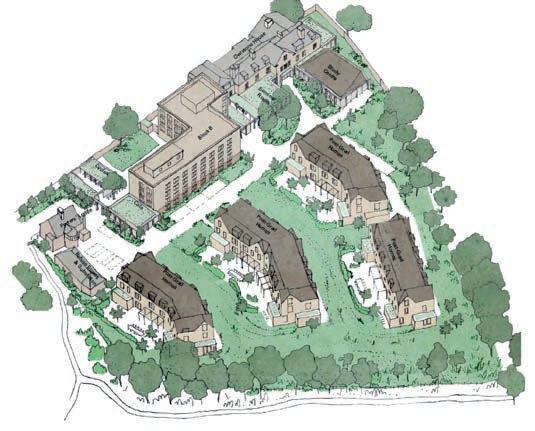
Queens’ House at Grange Road has an old chapel which would be ideal for conversion into a state-of-the-art Archive Centre. With ample accommodation for collections, readers, and our archive staff, Grange Road Old Chapel offers the perfect new home for the College’s archival collections, allowing accessibility to all who wish to come in and explore them.

In 2023, the College acquired a stunning property on Grange Road, close to Newnham College – our first major acquisition in central Cambridge since 1988. The building, previously The Margaret Beaufort Institute of Theology, is now home to over 30 postgraduates who have access to an on-site study space (currently known as the Lash Library), a large communal area, and a large garden.
To make the space appropriate, in terms of security and environmental conditions, considerable work will need to be done. Archives at Owlstone Croft have been moved to the new chapel already. The next phase will be securing almost £1 million to renovate the space and bring the collections currently held at the University Library to the new site.
The College is embarking on an ambitious project to develop Owlstone Croft into the best postgraduate centre in Cambridge, with works scheduled to start in summer 2025.
Owlstone Croft is just a fifteen-minute walk from Silver Street, and since its purchase in 1989 has been home to a large number of Queens’ postgraduate students.
Development of the site is essential to give our growing postgraduate population a fitting home that truly feels like an integrated part of the College. It will have four new blocks (as imagined above), 60 student study-bedrooms and 87 student rooms. Communal spaces will include a gym, café, meeting and seminar spaces, launderette and kitchen, as well as landscaped gardens.
The new buildings have been designed to Passivhaus standards and existing buildings will be refurbished to improve their functionality and thermal performance.
The design of the Owlstone Croft project aims to create spacious, inclusive spaces that feel like home for our postgraduates. We want to replicate the sense of community that works so well at Silver Street.
As this ambitious project progresses, we will provide you with updates, including about giving and naming opportunities.


By Rebekah ‘Boo’ Hinton and Pippa Sayers (both 2017)
B: Pip and I first met during fresher’s week. I was a little nervous, knowing nobody in Cambridge, but was immediately swept up by the warmth and family feel of College life. Whilst it took me a bit of time to come to terms with the strange traditions (I remember jumping the first time the gong went off in formal hall) being guided through it all by my College parents, and others, was invaluable.
P: We crossed paths a couple of times during the first weeks but the first proper conversation me and Boo really had was a 1am cup of tea in her room in Fisher block. We had both spent the previous year living abroad (me in Senegal
and Boo in Bolivia) and were struggling with the contrast of that and the adjustment of moving to Cambridge.
B: During the first year Christmas holidays, Pip came up to Bradford to visit me and we were thrown straight into dressing up for a charity Christmas party. I’ve always admired Pip’s ability to jump straight into new experiences and connect instantly with people from every walk of life.
P: I have really strong memories of repeatedly bumping into Boo in exam term of our first year. She always bought biscuits to the library (which
If you would like to submit a future My room (mate) article, please get in touch at thebridge@queens.cam.ac.uk
I always gladly helped myself to) and we spent snatched revision breaks conversing about the bonkers-ness of the exam system and all the places we’d rather be. Boo was an anchor back to reality outside the bubble, and her trademark kindness was a real godsend that term.
B: We were both kept busy with various activities within College and beyond. Pip immediately dove into rowing whilst I got involved in the JCR as access officer, a particular joy as it involved engaging with schools and students in my home city of Bradford. I did also try out rowing but definitely couldn’t get as on board with the 6am starts!
Within our respective subjects we shared a passion for impact-orientated science, many a late evening was spent chatting about everything from environmentalism to public health. How we champion each other to try to do good (as small as it may be) wherever we find ourselves is something I love about our friendship.
P: During the summer of second year, Boo and I both stayed around in Cambridge doing research internships. It was a great time to spend time together; enjoying the city in the sunshine, watching rubbish TV, and having picnic-dinner dates of whatever was on offer at Sainsbury’s!
B: For third year we lived together in E3, Old Court. It was a beautiful old room which we crammed full of colour and stocked full of tea. We even had a contraband oven for nachos and pizza nights (I hope we’re beyond the statute of limitations). I couldn’t have imagined doing third year without sharing it with Pip, decompressing from the stress of my final year, dissertations, all alongside working out what to do after finishing. Every day ended with a debrief and hug, celebrating the little wins and
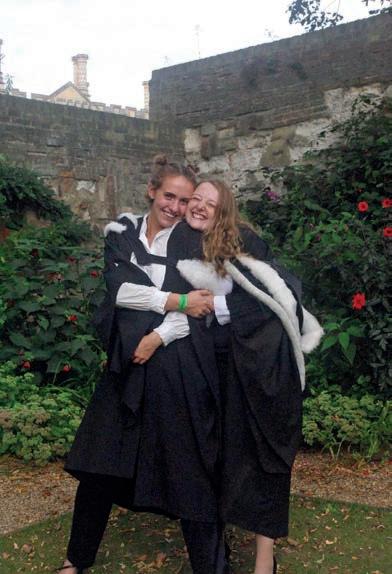
shouldering the stresses together (I will even forgive her for constantly leaving empty biscuit packets discarded round the room…).
P: We shared the shock and stress when it became obvious that COVID was going to change things. We very quickly had to pack up our room, say goodbye and leave College to complete the final term of third year at home. We ate our final dinner together in that room, sat on the floor surrounded by boxes of our stuff (the table was too full of packing to be used). It was an abrupt end but the friendship continued with very regular (and extremely long) phone calls over the following months and years.
B: After third year, I started a PhD in Glasgow looking at safe water provision in Malawi whilst Pip returned to Cambridge for the start of her clinical training. Pip would regularly come up to Glasgow for visits and fell in love with the place as I had, it became a bit of a joke that she’d obviously end up moving here for her foundation years. The spare room had her name on it (literally)!
P: Towards the end of my clinical training, the time came to decide where I wanted to be for the next stage of training. We’d always joked about me moving up to Glasgow and in the end I decided to just go for it! I applied for a foundation priority programme based in Inverclyde (just outside Glasgow) and somehow 6 months later I was squishing everything I owned into a car to drive it up here. It was a great chance to explore a new city and practice medicine somewhere different to Cambridge and I’m so glad I made the leap. It has been a great year; I love the city, my job, the mix of patients I work with, and, of course, getting to spend time with Boo. From the arts classes, dance workshops, proof-reading of her papers, practicing presentations with each other, rainy stomps round the park, and ever so many shared dinners – it’s been so much fun sharing this time together, and she has been such a kindhearted support through all the ups, downs, and anxieties of my first year of work here.

B: It has been amazing being roommates again. I have loved coming home to debrief our days over buckets of tea and good food. It has also been so amazing to see Pip throwing herself into being a doctor in Glasgow with the passion, empathy, and energy she has brought to so many other things. Being in Scotland has also meant we have been able to have plenty of fun adventures including wild camping in the highlands and ‘Baltic’ (icy) loch swims.
It was therefore a very difficult to contemplate leaving Glasgow as the end of my PhD neared. Pip’s support through contemplating life changes and jobs was as appreciated as it was in third year, and knowing we’ll be there for each other, no matter whether we are in the same room or across continents, made exploring options much less daunting. I was excited to be offered a brilliant postdoctoral research position at Wageningen University in the Netherlands looking at water security. So, it was another sad (although excitement-tinged) goodbye to my roommate again as I finished my PhD and headed to the Netherlands.
P: Whilst Boo moved to the Netherlands for her postdoc, I’m still loving being in Scotland. I’ve just finished my F1 year and am into my second year. This kind of just feels like a hiatus to our roommate-ship, we very much hope to share again in the future! In the meantime, there are plenty of long phone calls and visits; we’re planning to meet up in Paris soon. Reflecting on these last 8 years now, I honestly can’t imagine what my life would look like now if I hadn’t taken her up on that cup of tea in fresher’s week.

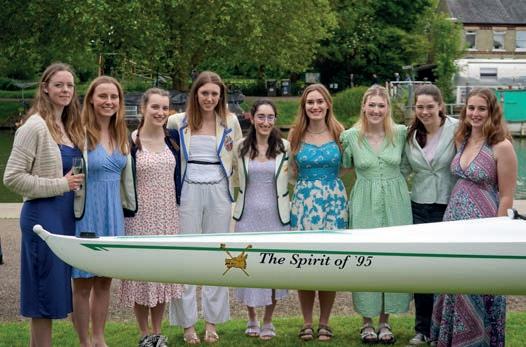
On Saturday 31st June, alumni, coaches, and students gathered at Cantabrigian Rowing Club to name the new women’s 1st VIII. The boat, a Filippi F54, was purchased earlier this year thanks to the kindness of 22 Queens’ alumni who matriculated between 1950 and 2017.
Alex Bidlake (1995), who generously provided matched funding during the fundraising campaign, reminisced about her experience at Queens’ and the value of rowing at QCBC, both in terms of the friendships she made and the passion she found for the sport. Alex continues to row, representing the Hong Kong Yacht Club at the Rowing World Master’s Championships and many other races each year.

The boat has been named The Spirit of ’95 to recognise the contribution of the two principal donors, Alex and Fraser Allan (1995), who won their oars together. Alex hopes that this name will continually remind our coxes and rowers that the alumni are their “biggest fans,” cheering the students on from around the world.
The event concluded with a prayer from the College Chaplain, Revd Anna Jones, who blessed the boat and all those who will row in her over the coming years. This was followed by a ceremonial row by the current W1 crew.
The College is very grateful to the donors to the boat and all those who continue to support QCBC.

May Week saw the much-anticipated BATS production of Much Ado About Nothing across three days in College, and it is hard to imagine a more perfect setting for this charming and summery play than Cloister Court on a bright Spring day.
The comedic talents of the cast were spot on and, as Varsity described it, “director Imogen Carter struck a wonderful balance between ‘rom’ and ‘com’ in this cheerful production of the Shakespearean classic.” Plenty of interactions between cast and audience made it an engaging and immersive experience for all.
With several famous former BATS’ alumni such as Joanna Scanlan (1980), Stephen Fry (1978), and Khalid Abdalla (2000), perhaps we will be seeing more of this cast in the future. What a fabulous way to spend an afternoon!
2023:
Blessing for Douglas O’Rourke (2003) & wife Vera (service conducted by Revd Jonathan Holmes, MRCVS (1967))
2024:
Adam Jones (2009) and Caroline Hopper (alumna of Homerton and Queens’ Choir)
Blessing for Anna Horton (2015) and Lewis James (all the way from Brisbane!)
Jon Hall (1998) & Naomi Earley
Debayan Dasgupta (2010) & Julie Vitalis
Sophie Brown (2014) & Herman Lam
Nuptial Mass for Yiren (Angela) Wang (2016) & partner

Each year, the Alumni and Development Office hosts the 1448/Arthur Armitage/Family Day Garden Party. Entertainment is provided for children, in the form of a bouncy castle, face painting, garden games, and ice cream on Erasmus Lawn. 1448/Arthur Armitage (now The Sundial Circle) members are also invited to the President’s Garden, where they can enjoy performances by Queens’ musicians. Queens’ College welcomed over 300 alumni and guests at the 2024 Garden Party.
The Development Director, Rowan Kitt, delivered a speech to alumni providing updates on the latest developments at Queens’. He highlighted the success of our third annual Giving Day, which raised an impressive £463,000 from 625 alumni and friends of the College.
Additionally, Professor Julia Gog, Fellow, Director of Studies in Mathematics, and interim Vice-President, spoke about the importance of our Postdoctoral Research Associates (PDRAs) who thrive and build connections within an exceptional academic community.
Our most senior alum present was Paul Ryall (1952), who came to Queens’ 72 years ago to read Mechanical Sciences.
Queens’ is able to help many students with the cost of participating in College sporting activities through the Queens’ 550 bursaries, raised through generous alumni support 25 years ago. For those who face extra costs with university and national sport, there are endowed, postmatriculation bursaries and grants from Nelson Blues Fund, again made possible through philanthropy. Additionally, the College thanks Blues and HalfBlues for their efforts through the annual Blues Dinner.
The Angevin Talks is an innovative speaker series hosted by Anna El-Erian at Queens’.
Anna invites a select group of the most inspiring and influential individuals of our time to share their experiences and discuss critical issues facing our society today.
The most recent talk in the series was a popular conversation between Anna and Barbara Frenkel, Executive Board Member, Procurement, at Porsche AG, followed by a Q&A.
Barbara first joined Porsche in 2001 and held various management positions until being appointed to the Executive Board at Porsche AG during the coronavirus crisis. Among other things, her team had to cope with the disruptions in global supply chains.
She is currently the only female appointee on the Executive Board of Porsche AG. In addition to her departmental responsibilities, Frenkel also focuses on female leadership and mentoring.


(bottom row) Ella Heathfield, Sophie Moody-Stuart, Owain Houghton, James Onley-Gregson, Elizabeth Neri, Rowan Kitt, Rosa Humphreys, Anna Clay, Scott Partington, Ciara Boaden, Lil Bingham
Professor David Menon was recognised in the 2024 King’s Birthday Honours list. Professor Menon is the founder of the Neurosciences Critical Care Unit and was awarded a CBE for his services to Neurocritical Care. The recently established Rokos-Menon Senior Research Fellowship in his name is the first Fellowship of its kind at Queens’.
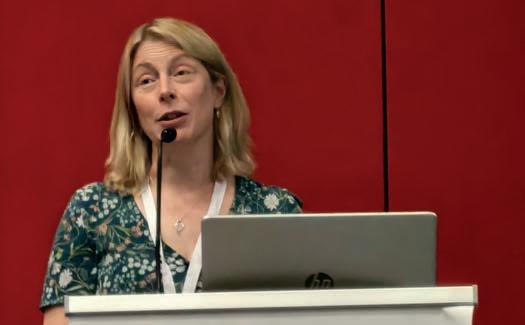
The European Research Council (ERC) has awarded Professor Beverley Glover an Advanced Grant for her project titled ‘Convergent evolution of floral patterning through alternative optimisation of mechanical parameter space’. The Advanced Grant is awarded “to outstanding research leaders across Europe.” Professor Glover is Director of the Cambridge University Botanic Garden and a Fellow in Natural Sciences at Queens’.
The Institute of Physics awarded Dr. Ramsey Faragher (Bye-Fellow in Computer Science) the Dennis Gabor Medal for his numerous contributions and innovations in new signal processing and sensor fusion techniques for radio positioning systems and GPS receivers. This follows last year’s recognition by the Royal Institute of Navigation, where he received the Harold Spencer Jones Medal, which is their highest award. The Dennis Gabor Medal is awarded “for distinguished contributions to the application of physics in an industrial, commercial, or business context.”

John Harding (2016) was appointed to the Office for Students’ Disability in Higher Education Advisory Panel in April. He has been Head of the Cambridge University Accessibility & Disability Resource Centre since 2008, and occasionally takes on the role of Director of Studies in Education at Queens’.
Queens’ is pleased to announce that Official Fellows Professor Martin Crowley and Professor Graham Denyer Willis were promoted to Grade 12 professorships. Professor Crowley and Professor Denyer Willis are Directors of Studies in Modern and Medieval Languages and Geography respectively.
Ramsey is pictured on the right accepting his award

In June, the College hosted a lecture by Professor Rod Thomson, Emeritus Professor of Medieval History at the University of Tasmania, titled “The Cataloguer as Detective: Adventures with the Medieval Manuscripts of Queens’ College, Cambridge.” Queens’ has twenty complete manuscripts, and an astonishing collection of 200 fragments found in the bindings of early printed books, which are being catalogued by Professor Thomson for the first time. The talk explored their presence in the library and the challenges and rewards involved in identifying their contents. The complete manuscripts were not part of the College’s original collection but were donated from the seventeenth century onwards by various benefactors, including several Queens’ Fellows. The manuscript volumes are visually striking and generally well-preserved, many retaining their early bindings. Notably, two twin manuscripts feature remarkable sealskin covers.
The College has appointed Professor Philip Joesph, a professor in Law at the University of Canterbury in New Zealand, as Distinguished Academic Visitor. This will coincide with his term as Canterbury Fellowship at the University.

Dr Tyler Denmead (2007), Official Fellow in Education and Dean of College, won the ‘Student Partnership and Empowerment’ award from the Cambridge University Student Union.
Tyler said “It may have had something to do with my LGBTQ advocacy work last year, or perhaps my work with students on Islamic Decolonial Thought in Education this year… I’m grateful to my students who continue to inspire my thinking and my actions each and every day.”
Venn Prizes (First years): Giorgio Amasanti & Kevin Liu, (both 2023) were second and third in the Engineering Tripos; there were also ten Firsts in Part 1A Engineering – the best set of 1A results in living memory.
Hughes Prizes (Second years): Gigi Pezier (2022) – top of the Theology Tripos again; Isabelle Brown (2022) – second in the Medical Tripos, having been placed first last year; Maddy Wright (2022) – top of Part 1B History
Joshua King Prizes (Third years): Faizan Nawaz (2021) – hat trick of coming top of Theology; Ben Sutton (2021) – top of Earth Sciences; Victoria Romaniv (2021) –Economics; Margaux Cooper (2021) – top of Architecture.
Ruth Hendry Prize (Fourth years): Christian Hockey (2020) – top of Part 2B Engineering.
Renuka Chintapalli (2018) won the Clinical School’s Gold Medal as the top graduating Medic.
Among the “Foundation Year” cohort, a Queens’ student came top of the University programme.
Right: Faizan Nawaz (2021)
Far right: Maddy Wright (2022)


Remembering the College in your Will enables you to shape the future of Queens’ well beyond your lifetime.
Bequests, no matter how large or modest they may be, are essential to ensure the long-term financial security of the College. It is largely thanks to the generosity of our legators that we are able to provide a world-class education for the 1100 students who call Queens’ home today. Please consider joining the over 480 alumni and friends who are leaving a legacy to Queens’.

Queens’ is proud to announce that we have partnered with MakeAWillOnline.co.uk to provide our alumni with a simple, safe, and secure way to create a free online Will and include a gift to the College. Using this service is an excellent option if you are writing a Will for the first time!
Scan the QR code to create a solicitor-checked Will. You’ll also receive complimentary access to Capacity Vault, a clever tool for safeguarding your Will’s wishes online.
If you create a Will via MakeAWillOnline, the College will be notified when a Will is written that contains a gift to Queens’. This greatly aids our future planning. If you wish, you can also consent to share your name and contact details with us, allowing us to invite you to join The Sundial Circle
If you would prefer to work with a solicitor in person or already have one, we encourage you to do so. This is especially important if your estate exceeds the inheritance tax threshold, or if it includes complexities such as trusts or foreign assets. You can find a local solicitor through the Law Society website.
Leaving a charitable gift in your Will can mitigate the amount of inheritance tax your estate pays. We recommend that you speak to a solicitor or estate planner to learn more about how to make the most of this, thereby maximising the benefit to the College and your other beneficiaries.
We encourage legators to leave residuary, rather than pecuniary, bequests so that the impact of the gift is not dampened by inflation. When your Will is drafted, please ensure you include our full charity name, charity number, and registered address:
“The Queens’ College of Saint Margaret and Saint Bernard, commonly known as Queens’ College in the University of Cambridge, Silver Street, CB3 9ET, whose registered charity number is 1137495.”
The nature of leaving a legacy to the College means that it is impossible to predict exactly when a bequest will come to fruition. Hence, we encourage legators to be as broad as possible with regards to the desired allocation of their gift. Most alumni will leave a gift to the Unrestricted Fund as this means we can allocate the gift where it is needed most, as and when the time comes.

The College has decided to rename our legacy giving society. Previously known as The Arthur Armitage Society, this society will be known as The Sundial Circle going forward. Legators to the College automatically become members of The Sundial Circle after notifying us that they are kindly remembering Queens’ in their Will.

If you have already written the College into your Will but have not yet notified us of your decision to do so, please contact the Alumni & Development Office. We will be sending pin badges to all members in the post very shortly.
We are incredibly grateful to all those who are legators.
To find out more about legacy giving or The Sundial Circle, please contact Hannah Badger by emailing development@queens.cam.ac.uk

The 1448 Society was established to recognise the vital support of so many of our kind alumni and friends who give back to the College via a regular gift.
We are fortunate to have over 1,100 members of The 1448 Society – almost 7.5% of our entire alumni population. Regular gifts are crucial to help us secure a bright future for the College; they provide a stable foundation which we can use to forecast ahead.


Thank you, sincerely, to all those who give back to Queens’.
If you are not a member of The 1448 Society but would like to find out more, contact Emily Walsh at emw81@cam.ac.uk
“ My time at Queens’ greatly impacted my life and I hope through giving that this can make a difference to the lives of the current students.”
Melissa Dewar (2020), 1448 member
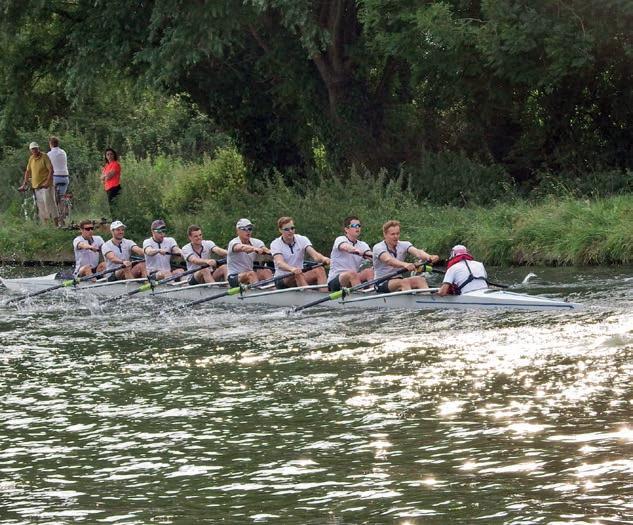
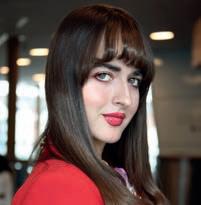
The 1828 Society was formed last year to unite and thank the Boat Club’s generous, regular supporters.
We look forward to welcoming 1828 members back to the College for special events, including race days and the upcoming Fairbairn’s Cocktails event which is taking place in December. Members of the society receive a Boars Head pin when they begin their regular gift, which we hope they will wear proudly as a display of their dedication to the club.
Thank you to all those who already support the club, enabling QCBC to be as accessible, enjoyable, and successful as possible.
To find out more about how to join The 1828 Society, contact Emily Walsh at emw81@cam.ac.uk

To mark the centenary of the death of Charles Villiers Stanford, who was Organ Scholar at Queens’ in 1870, alumni of the choir were invited to join the current choir for Evensong in April. Nick Morris (2011), Director of Music, conducted the 80-strong choir through some of Stanford’s most renowned works. The day’s events also included an organ recital by Martin Baker, and an exhibition of material related to Stanford’s time at Queens’ in the Old Library. The Evensong concluded with a sermon by Professor Jeremy Dibble, followed by a dinner in Old Hall.

The Fellowship thanks major donors for their support of the College at the annual Benefactors’ Ceremony. The Praelector leads the benefactors into Chapel where the Fellowship awaits. Each person is thanked by the President (in Latin) with the Fellows arranged on the steps of the sanctuary. At last April’s Ceremony, Millie Clark (2022) played the flute during the muscial interlude and Ellie White (2020), a fourth-year medic, gave the Address. Organ Scholars Jack McCabe (2021) and Zane Soonawalla (2023) also performed. The traditional Feast followed in Old Hall, at which the President reiterated his gratitude for the generosity of alumni and friends of Queens’.

Stephen
Alex
Alan
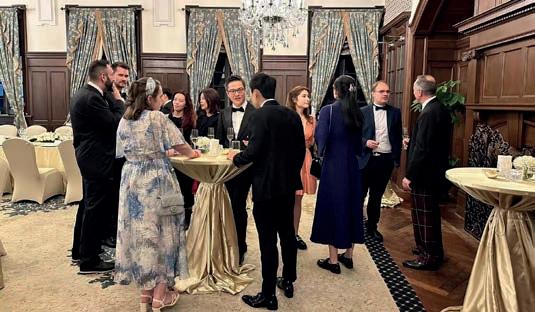
Development Director Rowan Kitt co-hosted a dinner with Luya Duan (2018) (Queens’ Global Ambassador) and Kevin Xu (2009) (President of Queens’ Development Committee) in Shanghai, during his trip to China and Malaysia in the spring.
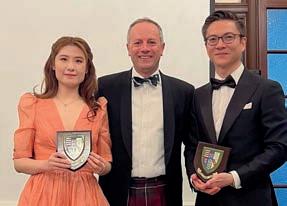

Queens’ Chapel Choir embarked on a packed itinerary on their July tour of Switzerland and Italy. This comprised of concerts in Airolo, Lugano Cathedral, Locarno, Como Cathedral (pictured), Novara Cathedral, and Zurich.
“ We always keep the door open for the Lodge, but when I first started it was always shut.”

Before joining Queens’ College in 2018, Dave spent 30 years in the Cambridgeshire Police. Born and raised in Cambridge, working at the College was always something he wanted to do after he left the police.
What do you enjoy most about your role?
I think Queens’ is a fantastic place. I’ve got great staff and we always have a good laugh and a joke. We get on well with all of the other departments and staff – we all intermingle and help each other out as much as we can. The Fellows are very nice, very friendly, and they all come and have a chat. The gardens are lovely, and to have a Lodge like ours – we’ve got a beautiful view of the River Cam, we’ve got the Mathematical Bridge – it’s fantastic.
Has your role changed over the six years you’ve been here?
The role is very hard to describe unless you do it, but fundamentally the role is the same. The main thing we’ve changed is that we’ve made it a bit easier to streamline keys and procedures. When I first started, everything was manual. Keys were checked out on a sheet of paper, but now it’s all on a computer. We also try not to be too stuffy with things. You never used to
be able to bring your bike through the Porters’ Lodge, so we changed that. We always keep the door open for the Lodge, but when I first started it was always shut. It’s just little things. We try to make everything a bit easier for everyone. If there are issues or problems with other departments, we try to help them out. If it works, fantastic, if it doesn’t we’ll go back to the drawing board. If they need support, I obviously help them out as best as I can.
Do you have any fun facts or stories that our Alumni might not know about?
In terms of stories, we do a bike cull normally twice a year. We let everyone know they’ve got two weeks to register their bikes, then we cut the locks of bikes without a sticker and store the bikes before giving them to charity. Well, on one cull day, there was a Rotary Club meal and unfortunately Celine (Duffield, Porter) took one of their locks off because it didn’t have a sticker. I saw him walking back and forth, scratching his
head, and I said, ‘I think I know what’s happened here.’ We bought him a new lock and brought his bike back. Bless his heart, but it was funny.
Is there one day during your time at Queens’ that stands out the most to you?
Definitely Queen Elizabeth II’s visit in 2019. I had only been here for about a year, and I had quite a lot of interaction with the Royal Household regarding her Royal Standard flag. When the Queen sets foot on the College grounds, our flag should come down and hers should go up, and they should meet in the middle as they pass. We were practising the day before, and I’ve honestly never laughed so much in my life. They kept getting tangled around each other, and I had to leave the other Porters to it because I just couldn’t stop laughing. On the day, they did it perfectly. Everyone was so pleased to see her, which was brilliant, and we’re lucky that we did. That was a fantastic day.
